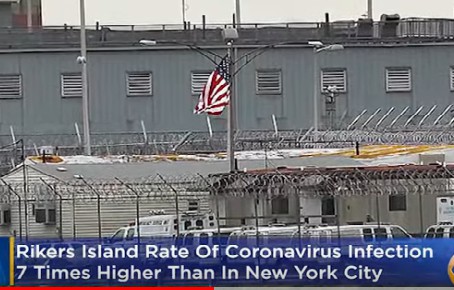[RIKERS ISLAND\COVID-19]
Williams: “While your current efforts to curb the impact of COVID-19 within our jails are noted, I still believe there is much more to do to curb the preventable rise of COVID-19 cases within Rikers.”
Photo: YouTube
New York City’s Public Advocate has sent a letter to Department of Corrections Commissioner Cynthia Brann regarding COVID-19 outbreak at Rikers Island.
Public Advocate Jumaane D. Williams called for answers and accountability in a letter to the New York City Department of Correction today, following complaints to the office and public reporting on the inadequacies and dangers of the response to COVID-19 on Rikers Island, where the contraction rate of the virus is seven times higher than the rest of New York City.
In the letter, the Public Advocate cites reports that social distancing policies are being egregiously violated and that incarcerated individuals and staff are not given supplies to sanitize spaces even as the outbreak continues to grow. He questions the criteria to make one eligible for release, the status of PPE supplies, and the medical treatment available for those inside, saying “While your current efforts to curb the impact of COVID-19 within our jails are noted, I still believe there is much more to do to curb the preventable rise of COVID-19 cases within Rikers,” and highlights the need to protect vulnerable communities.
The full text of the letter is below.
“Dear Commissioner Brann:
“I write concerning complaints my office has received, and as reported in varied press accounts, regarding the Department of Correction (“the Department”) response to the threats posed by COVID-19 to the incarcerated.
“My office has received three complaints from concerned family members of incarcerated individuals that protective gear was not worn by staff, particularly in the Eric M. Taylor correctional facility. The facility relies largely on incarcerated individuals to clean their living space, yet complaints allege that staff and incarcerated individuals are not given supplies to properly sanitize and reduce the spread of this deadly virus in the North Infirmary Command unit, the Rosemary Correctional at Rikers and the Obis Bantum Correctional Center. Some individuals have reported having to take initiative and use their own items, purchased from the commissary, to clean, such as shampoo and crushed soap. Our office has received six additional complaints regarding unsanitary conditions in correctional facilities, particularly around lack of availability for soap and sanitizer.
“Reports have indicated that social distancing has not been put into practice, with individuals allegedly lying on the concrete floor only six inches apart from one another during their intake process and only inches apart from one another during mealtimes. Our office has also received fourteen complaints of social distancing non-compliance from concerned family members of those incarcerated, as well as corrections officers. While some correctional officers are given masks and gloves to wear, inmates are allegedly left without any proper preventative gear.
“Additionally, reporting in The Intercept today alleges that incarcerated individuals are being asked (or required) to dig mass graves on Hart Island, for a wage of $6 an hour, in addition to receiving protective gear.
“While your current efforts to curb the impact of COVID-19 within our jails are noted, I still believe there is much more to do to curb the preventable rise of COVID-19 cases within Rikers, which is outpacing the rates of infection of the City. As we continue to ensure the safety of all New Yorkers during this unprecedented time, I have a number of questions concerning the safety and wellbeing of incarcerated people and of workers of the Rikers Island Correctional facility alike:
1. In total, how many people-such as those on technical parole violations, vulnerable populations and those on city sentences-has the Department deemed eligible for release during this crisis? Please disaggregate by age, race, borough, reason for detention/incarceration and whether they have been released into family care, hotel rooms or other location.
2. Can you explain what the department terms “risk to public safety,” when determining who is eligible for release during this pandemic? What are the other metrics?
3. What services and supplies are provided for people who are released during this time?
4. Are there any shortages, and, if so, how are they being filled?
5. For people who are released from Rikers into hotel rooms, what programming and activities are provided post-release?
6. Are people released from Rikers Island first tested for the coronavirus? If they test positive, what guidance or care is given?
7. What protective gear is provided for Department personnel? Are any reused?
8. Given the shortage of protective masks, what procedures has your office implemented to protect corrections officers, especially those who interact most with incarcerated individuals?
9. What extra cleaning and hygiene supplies are provided to workers and incarcerated individuals alike to ensure maximum hygiene?
10. How does psychotherapy continue to be provided to incarcerated individuals? Has the Department switched to teletherapy when necessary?
11. How is social distancing practiced during mealtime when those incarcerated are scheduled to eat in the same cafeteria? What changes have been made during this crisis? How many complaints have you received regarding the lack of social distancing, broken down by staff complaints and incarcerated individual complaints?
12. How often are facilities cleaned each day to prevent the spread of the virus?
13. Are people in isolation provided books, computers and phone access while in isolation?
14. How are your COVID-19 isolation measures different from those inmates placed in punitive segregation?
15. How often are inmates who test positive receiving treatment?
16. What is the revised policy regarding incarcerated individuals contacting their family members?
17. Are those incarcerated notified if a family member has been diagnosed or hospitalized with COVID-19? If so, are these individuals given extended time to speak with those diagnosed as positive and provided with resources for support?
18. How many increased medical personnel has the Department hired during this pandemic?
19. How many inmates are scheduled to be transferred to state prisons? Given the halt on transfers, how is the Department ensuring their days in Rikers count towards their sentences?
20. With regard to Hart Island, are press accounts true that incarcerated people have been asked or offered the role of digging graves for six dollar per hour (or some other wage short of minimum or living wage)? If true, who determined this wage, and that incarcerated people would engage in this function?
Please contact First Deputy Public Advocate for Policy, Nick E. Smith, at [email protected], if you have any questions. We look forward to hearing from you. Thank you.
Sincerely,
Jumaane D. Williams
Public Advocate for the City of New York












